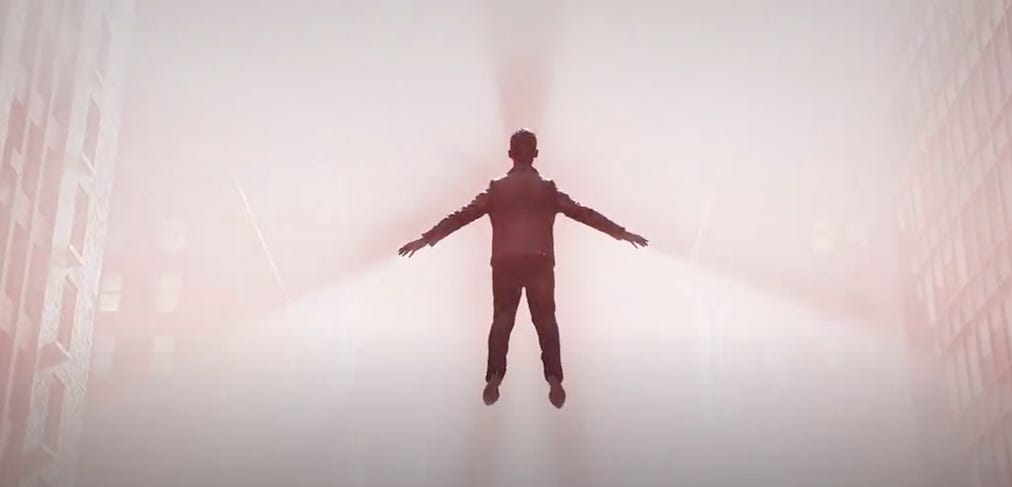I've been of the mind not to provide any commentary on a cover album that appears to relate to a personal letter, that would defeat the purpose of having edited it. But it was a real satisfaction to see David Gahan invert "Dark End of the Street" with the only video created for this album (the others are live performances).
What was the worst bet I said I could make with future artistic output? Predicting there would be allusion(s) to the Rapture. MKay, so some fun with this: I mean it's non verbal but David Gahan's visual offering suffices as an analogy for The Rapture, don't you think?
Here's the really fun conundrum: because David Gahan produced it, no one knows whether he was privy to Martin Gore's letter or not, which only referenced the Rapture more than a dozen times, including the first citation, which was witnessing U2's ZOOTV concert and thinking, "This is it. This is the beginning of the Rapture." -Without a certain track being revisited after eleven years, I never would have mentioned it. (It takes guts.) I only did in the letter, not the book. Anyway, even in the revised edition "Rapture" appears on p. 12, 13, 26, 29 and 38 multiple times, which makes me crazy enough to say so, and make the grand bet.
So here's the fun, was that produced intentionally, in order to indicate accord? We have no way of knowing, which could be part of the intention, as it appears to have been the first time 'round with Bono twenty-two years ago. So, you tell me, which is the more impactful implication, -that Martin Gore's bandmate did this fully accidentally with no knowledge of the letter, or responded to it artistically being privy to its contents, because Martin shared it?
Welcome to my world. This is the existential limbo Bono shunted me into without a choice for over twenty years, by this choice of tact, for that long. Just as it was with U2's first album after the encounter, (and the second, and the third, and the fourth, and the fifth), I don't know for certain if David Gahan produced this intentionally, but I can explain it from end to end in terms of that letter. And what does it signify, if anything, that this happened at the point of contact by direct mail, not anywhere else? (-Yet.)
What I find really interesting is that the advent/symbolism in Jack White's video for "Love is Selfish" is strikingly similar, with himself in a state of confinement at an empty gig where no doors open and nothing works, until a woman steps in from the outside using a door that for him was locked (blazing blinding light) and gives him money so quickly that he hardly sees her, which is very similar to what happened with the hand off of the flash drive[s].
Anyway, these are the only two artists I've contacted personally with printed letters in the last ten years, -and they've both responded artistically in almost the same way, with practically the first videos they've put out since the letters were delivered (both were the second videos). That's it, that's the tweet.
I don't want to analyse Jack White's song apart from what I've already mentioned (the train). It actually can be approached three different ways and I've no interest in embracing any of them. (Let's see if a full album provides any context or whether there's anything even to say.) I will mention one aspect, which is "Love" is always saying "me, me, me", because it's been with me as a debate since the very start, namely what was the point of delineating the universal feedback loop at all, if it only delineated you as object? How is that different from "me, me, me"? Was there even a point to documenting it all in a book? That was a fear without a terminus... And I decided upon opening Jack's letter more than a couple years later that it was terribly self-absorbed (eighteen pages long for a start). I consider it an unfortunate byproduct of being forced to internalize way too much for way too long. It looks like maybe a reply letter is in order, but would that count as creating with your hands? At any rate I think this song is about a transcendent force that appears unbidden and is therefore disruptive (because it's beyond your intentions, its appearance changes them), while the interior struggle remains the same, if not upped in terms of scale.
This entry is backed up and archived with the lyrics to “Love is Selfish” here.



